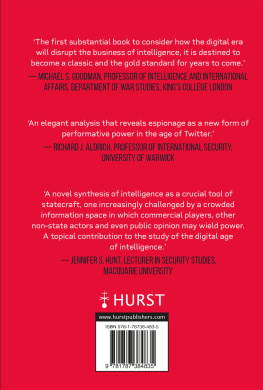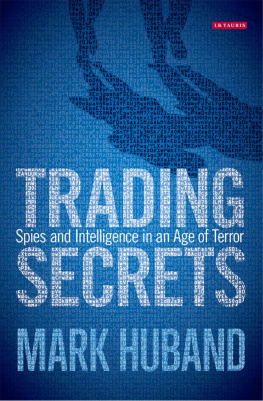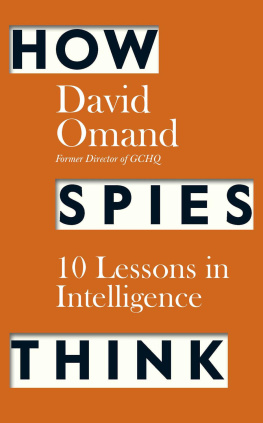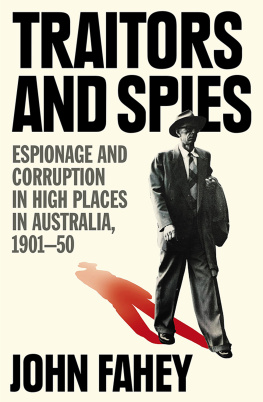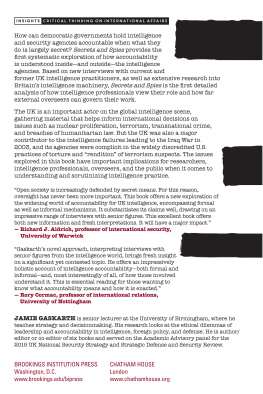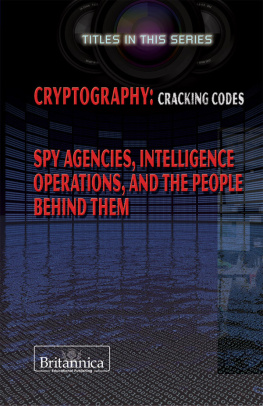Table of Contents

HACKER, INFLUENCER, FAKER, SPY
ROBERT DOVER
Hacker, Influencer,
Faker, Spy
Intelligence Agencies in the Digital Age

HURST & COMPANY, LONDON
First published in the United Kingdom in 2022 by
C. Hurst & Co. (Publishers) Ltd.,
New Wing, Somerset House, Strand, London, WC2R 1LA
Robert Dover, 2022
All rights reserved.
The right of Robert Dover to be identified as the author of this publication is asserted by him in accordance with the Copyright, Designs and Patents Act, 1988.
Distributed in the United States, Canada and Latin America
by Oxford University Press, 198 Madison Avenue,
New York, NY 10016, United States of America.
A Cataloguing-in-Publication data record for this book is available from the British Library.
ISBN: 9781787384835
www.hurstpublishers.com
This book is dedicated to my wife, Chrissie.
Wife, life-partner, best friend. You have taught me the value of things outside the academy, the value of family time and holidays, the joy of running through muddy fields, and how cool our gang is. Thank you for putting up with me whilst Ive been doing the dawn chorus starts and the witching hour finishes of writing this book, worked on impact case studies, marked papers, prepared lectures and supervised my large cohort of PhD students. If you are reading this it is finally over, and its time for us to go and have more fun.
This book is also dedicated to our children. You are a fine product of our parenting(!)
CONTENTS
PART ONE
ENFORCING LIBERAL HEGEMONY
PART TWO
THE PUBLIC CONSUMPTION OF INTELLIGENCE
ACKNOWLEDGEMENTS
I like the Kremlinology of acknowledgements. Those who are thanked and noted, and those who are not. As a device, I think the negative-acknowledgements section has been long overlooked. Even so, I have been persuaded not to begin this trend.
I would like to thank my parents, Richard and Janet, for sparking a lifelong interest in security and politics andas I can now see as a parent myselfthe value in placing a strong emphasis on reading and lifelong learning. Without you, none of this would be possible.
I would like to thank Andrew Monaghan for his enduring friendship, his wise counsel, his studied irreverence and scepticism and his generosity in reading drafts and framing his critiques with precision and care. It is life affirming to know that a mutual admiration of TMS (Test Match Special), knowledge of the noble game, some mobile telephony and the occasional days at cricket grounds can amount to some of the very best in life.
I would like to thank Erik Jones, who has been a strong feature of my intellectual life since 1997. He has beenin turnspersonal tutor, sparring partner, co-writer, provider of critiques, great dinner company, the right kind of bad influence and righter of wrongs.
I have some obscured acknowledgements I hope you will forgive. Many thanks to Mike Goodman for being a fine and longstanding research collaborator and to David Omand for wise counsel and sharp critiques. I would like to thank Tim for his abiding wisdom; Patrick, for our wonderfully vigorous exchanges of views; Mark Laffey for being the vision thing; Richard Paterson for instilling early rigour, the Tapir, Hank, Roger and Linda for excessively good advice; Friedi for her valuable and wider insights; H&H for being jointly delusional that they are my favourite former students; and Mike Caine and Sarah Childs for making me a far better academic than I was when I respectively first met them.
INTRODUCTION
INTELLIGENCE IN THE UBIQUITOUSLY INTERCONNECTED
INFORMATION AGE
The case for intelligence:
If you know neither yourself nor your enemy, you will always endanger yourself.
Sun Tzu
Understanding the limits of intelligence:
Reports that say that something hasnt happened are always interesting to me, because as we know, there are known knowns; these are things we know we know. We also know there are known unknowns; that is to say we know there are some things we do not know. But there are also unknown unknownsthe ones we dont know we dont know.
Donald Rumsfeld

Many seek to make the business of government intelligence artificially complex. Those seeking complexity obsess about its architecture, its techniques and tradecraft, the technologies it utilises, the technologies it is threated by and what it says about our place in the world (whichever us that is). But at its heart, intelligence is simple: it aims to avoid surprises. Defensive intelligence seeks to avoid damaging surprises. Offensive intelligence seeks to spring surprises on others, and to disrupt our adversarys attempts to surprise us.
Our sense that government intelligence is complex comes through in the popular and academic retelling of the work of these secret communities. These accounts attempt to map out how agencies function, their relationships with the political elites, and what legal, political and moral authorities they call upon. Such retellings often also highlight particular incidents: those that have played out well or, more frequently, those that have played out badly. To sit alongside intelligence officials is to quickly lose the simplicity that characterises the mission, be it avoiding surprises, or identifying, containing and rolling back threats. It is to become immersed in the self-referential maze of their operating environment: from the impenetrable jargon, through to the difficulty of forming coalitions of the willing, bureaucratic turf wars and resource conflicts to enact reforms or transformation, to the political positioning of the agencies, the individuals within them, or the very business of intelligence itself.
This weight of complexity creates a fog of ambiguity for those trying to communicate what intelligence is, what it does, and how it does it. It prevents them describing what role and influence intelligence has on our politics and on the individual citizens relationship with intelligence agencies.
The lengthy Cold War and the precarious deterrence provided by the balance of nuclear forces between the NATO and Warsaw Pact nations provided the perfect backdrop to the development of large and technologically innovative intelligence services and a keen public and political interest in how intelligence works. Whilst the Cold War is seen by many as the highpoint of intelligence games and of espionage, the information era or internet age has come to be signalled by those concerned by governmental over-reach as a further high-water mark in intelligence activity and intrusions into the private lives of individuals. Both these statements contain some truths but they miss the extent to which the FANG companies (Facebook, Amazon, Netflix and Google) have created a surveillance society that is far more capable and intrusive than those of Western governments ().
The books, documentaries, social media feeds and other information sources that that aim to improve the publics understanding of intelligence have been framed around two basic tropes: the first is a steady conservatism around the description of intelligence organisations and processes, whilst being accompanied by a drip-feed of positive and negative operational details.
The second is the show-stopper revelation that generates public discussion. In the 1980s, Peter Wrights memoir Spycatcher aimed to provide a hitherto unseen glimpse into the world of Cold War espionage, including grand plots and scandals, although it became better well known because of the failed attempts by the UK government to censor it. Similar efforts by David Shayler and Annie Machon had similar but diluted impacts. WikiLeaks created larger storms with their Cablegate release of diplomatic cables, touching upon some of the work of intelligence agencies and parallel diplomacy ().

